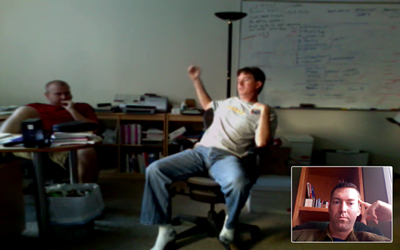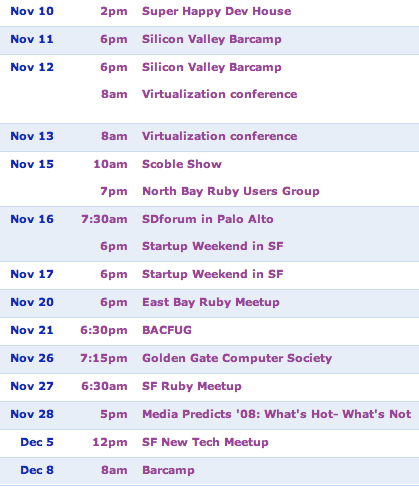 Having just completed the 54-hr-whirlwind journey of launching a startup company from scratch in a weekend here in San Francisco, I wanted to share some thoughts about what worked and what didn’t. I was fortunate enough to be able to interview the founder of startup weekend Andrew Hyde and one of his dramatic cohorts, Michael Gruen. It’s a short/sweet 30min conversation and gets at the heart of what they’re trying to do with these weekends.
Having just completed the 54-hr-whirlwind journey of launching a startup company from scratch in a weekend here in San Francisco, I wanted to share some thoughts about what worked and what didn’t. I was fortunate enough to be able to interview the founder of startup weekend Andrew Hyde and one of his dramatic cohorts, Michael Gruen. It’s a short/sweet 30min conversation and gets at the heart of what they’re trying to do with these weekends.
Let me just say that in every respect this was an amazing event. It condensed a year long product dev and launch cycle into just 2.5 days and it began on a Friday night with a room full of 132 complete strangers. The fact they were able to keep the wheels on the bus and deliver a working alpha by midnight on Sunday was an impressive feat in itself, but what was even more impressive was to see how leaders emerged and groups solved problems. The company we launched, HelpHookup.com managed last night to make the homepage of Techcrunch (something we still haven’t achieved in our year of lobbying efforts with JumpBox).
What worked well
The selection process was well-run. Ideas that had been proposed prior via the web site were pitched by their originators and every fourth idea the room broke into small groups of four to discuss. Someone called it “speed dating for nerds” and I suppose that was an accurate description of that frenzy. The selection was ultimately whittled down to just three ideas. Oddly enough, none of them won and one of the lesser-voted ideas re-emerged to win the selection process. I proposed a mutation of my Feelrz concept based on a genius twist that Josh Knowles had. Unfortunately the idea didn’t make the cut. The room divided into functional groups (development, creative, marketing, bizdev, legal, usability) and I gravitated to the marketing group initially. Being that I wasn’t super-stoked on the idea that got selected, I made the decision about 30min into it to play the weekend a bit differently than most would. Rather than lock into one group and engage vertically, I would bounce around and assume a horizontal role observing the activities across all functional teams. Granted, the weekend wouldn’t work if everyone were to do this but I had the unique opportunity to assume more of a “press” role and observe how the teams worked and communicated with the larger group.
The majority of comments on the TechCrunch article were positive but there were a handful of haters that derided the weekend pointing to the unlikelihood of anything material benefit for the attendees. This position is understandable if the person attending the event goes in with the expectation that the sole value of the event is in the shares one receives in the startup that emerges. The true value of this weekend as I saw it was:
- A firehose of practical knowledge – wandering around the room absorbing all the dialogue and interaction between usability people, developers, marketers, etc. I couldn’t help but think of that scene in the Matrix in which Trinity is asked if she knows how to fly a helicopter and she responds “not yet.” Moments later a lifetime of flight experience is dumped into her brain and she has what she needs. The value of the collective experience from the folks that were interacting in that room was incredible. For anyone who’s entertaining doing a startup, attending a weekend like this would be invaluable in getting a taste for what’s involved.
- A connection bonanza – given the nature of the event and who decides to stick around until day 3, it’s no surprise that the solid people filter through and you meet incredible individuals that share the same passion for the industry as you. I met some kick-ass people this weekend (Jeff, Mike, Andrew, Chris and Jeremy).
- Lessons in leadership – you get to see first hand how certain people emerge as leaders, how the stew of different personality traits creates pockets of different styles and how natual selection naturally takes care of the wacko’s.
Suggestions for improvement
I do have some suggestions what modifications that could make the weekend better:
- Allow multiple ideas – I know this is counter to the mission of picking one idea and having everyone rally around it but there was 50% attrition each day and I attribute this to lack of interest in the chosen idea on the part of those that left. I was more interested in the event itself but I probably would have not returned the second day if I was purely there on valuation of the chosen idea itself. I would urge the organizers to experiment with one weekend where the group is permitted to organically self-form around any ideas. There will naturally be one or two that are more popular but I would expect to see great things from a small 4-person team if they were passionate about the concept. Plus, some of the functional groups could work across ideas (creative for instance should necessarily be partitioned and constrained to working in 4 different silos in the event 4 ideas are chosen – dev makes sense to split into teams however). This is the biggest qualm I had. I understand the counter argument to this approach in that it might fragment folks and detract from the community aspect which is the primary goal, but I don’t believe that would happen if it were glued together properly and certain teams worked horizonally across multiple projects.
- Phone tree buddy system to reduce attrition – so obviously this is the “stick” as opposed to the “carrot” method above for mitigating the attrition problem but implementing some kind of buddy system in which you got a phone call the next day from someone in your group saying “hey where are you? we need you to do xyz” would keep more people there the same way having a workout partner at the gym is just enough to make you go back to the gym. This is a challenging problem and one we encountered first-hand with Grid7 Labs – when people aren’t on the hook to deliver it’s easy for them to blow it off. I would expect this problem to lessen if suggestion #1 is followed.
- Better ad hoc infrastructure – this is a shameless self-plug for our stuff but a would be ideal instead of the hour it took them to get a subversion repository setup. The dev team also would have had access to the ticket system in Trac at that point which would make the accountability and assignment of tasks much more efficient. I showed Andrew the Trac JumpBox and it sounds like they’ll be using it in the future. This is precisely the scenario it was made for. Likewise, the talks I heard about securing a hosting account early in the event could have been avoided by merely serving it from a virtualized instance on someone’s laptop in the room and deferring the hosting issue until it was necessary. If the weekend is mapped time-wise to a year of the life of a startup, deferring the hosting decision translates to month’s of saved hosting fees plus the access to the local machine is much snappier than hitting a remote box over the internet during dev.
- Connectivity – this is just an issue of over crowding on a connection that wasn’t intended to have 130 people accessing it simultaneously but connectivity needs to made more reliable. Perhaps getting multiple EVDO cards and having alternative shared connections via that would help? I’m not sure of a silver bullet for this problem but solutions should definitely be explored.
Anyways, the weekend was fantastic and much props to all the people that labored to put it together. I met some great people and plan to stay in touch.


 Having just completed the 54-hr-whirlwind journey of launching a startup company from scratch in a weekend here in San Francisco, I wanted to share some thoughts about what worked and what didn’t. I was fortunate enough to be able to
Having just completed the 54-hr-whirlwind journey of launching a startup company from scratch in a weekend here in San Francisco, I wanted to share some thoughts about what worked and what didn’t. I was fortunate enough to be able to 







